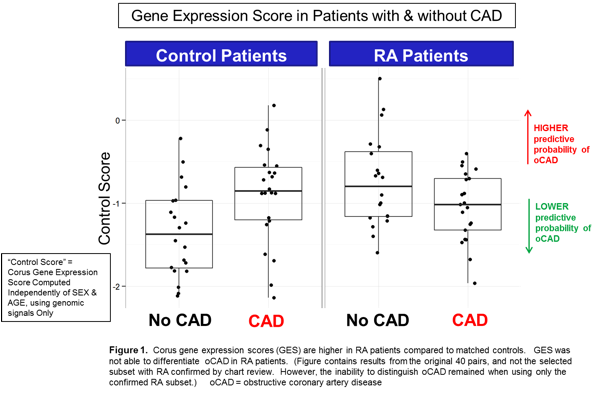Session Information
Date: Monday, November 9, 2015
Title: Rheumatoid Arthritis - Human Etiology and Pathogenesis Poster II
Session Type: ACR Poster Session B
Session Time: 9:00AM-11:00AM
Background/Purpose:
Peripheral blood gene expression profiling has been used to identify gene signatures which reflect a variety of pathologic conditions. The CorusCAD¨ test is a peripheral blood gene expression test incorporating age, sex, and gene expression into an algorithm which assesses obstructive CAD (coronary artery disease) likelihood in non-diabetic patients without inflammatory diseases. Our objective was to evaluate the validity of the CorusCAD¨ expression profile with CAD in persons with rheumatoid arthritis (RA), a chronic inflammatory condition.
Methods:
Twenty RA-non RA, case-control matched pairs of individuals with a range of known CAD were identified in a large cardiac catheterization cohort, CATHGEN. Rheumatoid arthritis patients were identified using ICD9 codes, and diagnosis was confirmed by chart review. Controls, without RA, were matched by sex, age, race, number of diseased coronary vessels, and BMI. Persons with type 2 diabetes were excluded. Gene expression levels of 23 CAD-associated genes composing the CorusCAD¨ score were used to determine the age, sex, gene expression scores (ASGES). ASGES were compared in RA and controls using a matched pair analytic approach (paired t-test).
Results:
In persons with RA, the range of CorusCAD¨ ASGES scores was similar for those with and without RA. Independent of CAD, persons with RA had higher Corus ASGES scores than matched controls (P<0.04). Specifically, RA contributed to a 10% increase in CorusCAD¨ ASGES when controlling for CAD using the matched design. RA was associated with higher expression levels for 6 of the 23 genes (P<0.05 for all, not adjusted for multiple comparisons): S100 calcium binding protein A12; interleukin-18 receptor accessory protein; caspase 5; S100 calcium binding protein A8; aquaporin 9; and cluster of differentiation (CD)79b. All except aquaporin 9 are associated with higher expression in CAD.
Conclusion:
Across a range of known coronary disease severity, RA is associated with increased expression of CAD-associated genes; among these are two genes associated with neutrophil activation, S100A8 and S100A12. Both are associated with RA disease activity in published studies. Further work on the mechanism and consequences of gene activation for these genes is indicated.
To cite this abstract in AMA style:
Peart E, Huffman K, Kraus WE, Beineke P, Wingrove J, Rosenberg S. Gene Expression Profiling Reflects Increased Expression of Coronary Artery Disease Associated Genes in a Case-Control Matched Study of Patient with Rheumatoid Arthritis [abstract]. Arthritis Rheumatol. 2015; 67 (suppl 10). https://acrabstracts.org/abstract/gene-expression-profiling-reflects-increased-expression-of-coronary-artery-disease-associated-genes-in-a-case-control-matched-study-of-patient-with-rheumatoid-arthritis/. Accessed .« Back to 2015 ACR/ARHP Annual Meeting
ACR Meeting Abstracts - https://acrabstracts.org/abstract/gene-expression-profiling-reflects-increased-expression-of-coronary-artery-disease-associated-genes-in-a-case-control-matched-study-of-patient-with-rheumatoid-arthritis/

